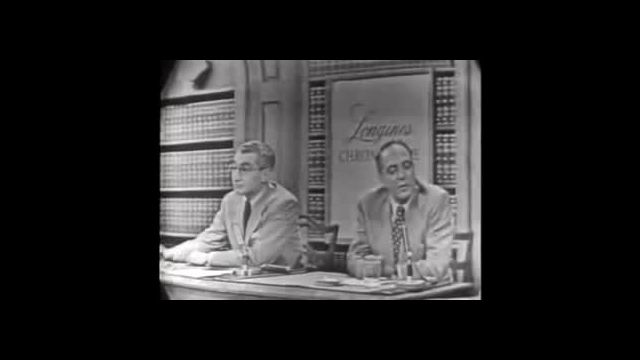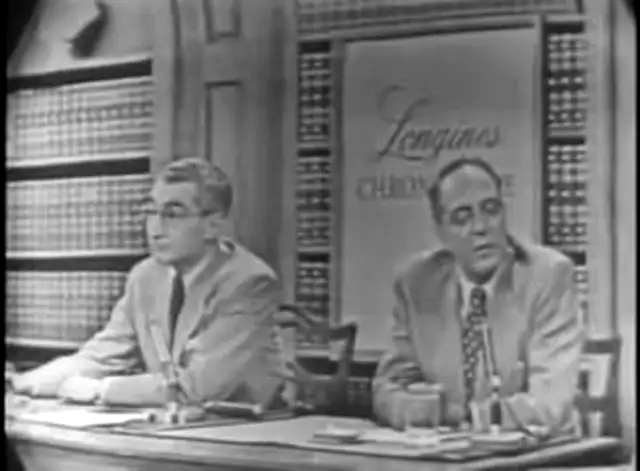Intervista a Dave Beck Presidente della Fratellanza Internazionale dei Trasporti
12 anni
0.9K Visualizzazioni
Categoria:
Descrizione:
President of the International Brotherhood of Teamsters: Dave Beck Interview. Dave Beck (June 16, 1894 -- December 26, 1993) was an American labor leader, and president of the International Brotherhood of Teamsters from 1952 to 1957. He helped found the "Conference" system of organization in the Teamsters union, and shot to national prominence in 1957 by repeatedly invoking his right against self-incrimination before a United States Senate committee investigating labor racketeering. After the war ended, Beck returned to Seattle and his job as a laundry truck driver. He became an organizer with the Teamsters. He successfully convinced hotels to contract only with unionized laundry services, which led laundry companies to unionize to win business. His subsequent rise in the Teamsters was quick: He was elected to the executive board of Local 566 in 1920, president of Joint Council 28 (which covered Seattle) in 1923, secretary-treasurer of Local 566 in 1925, and president of Local 566 in 1927. The same year he was elected president of his local, he was hired by the international union as a full-time organizer. In 1937, Beck formed the Western Conference of Teamsters as a means of counteracting the conservative leadership of Joint Councils in San Francisco. Beck persuaded Teamsters president Daniel J. Tobin that the Western Conference of Teamsters was no threat to the power and authority of the international union. Harry Bridges, leader of the International Longshoremen's Association (ILA), had led a successful four-day strike in 1934. Bridges was now leading "the march inland"—an attempt to organize warehouse workers away from shipping ports. Beck was alarmed by Bridges' radical politics and worried that the ILA would encroach on Teamster jurisdictions. But Teamster joint councils in Los Angeles and other California ports seemed unconcerned. As an end run around the complacent joint councils, Beck formed a large regional organization. Beck engaged in fierce organizing battles and membership raids against the ILA, effectively stifling the "march inland." The Western Conference of Teamsters, and Beck, emerged significantly stronger from these battles. As Beck's influence rose, Tobin attempted to check his growing power but failed. Beck was elected a vice-president of the Teamsters in 1940, and he began to challenge Tobin for control of the union. In 1947, Beck marshaled his forces and defeated a proposed dues increase to fund new organizing. In 1942, Beck began a six-year campaign to seize control of the International Teamster newsmagazine. He ousted its editor and won the executive board's approval to install his own man in the job in 1948. In 1946, Beck successfully campaigned to amend the union's constitution to create the post of executive vice-president. He subsequently won the 1947 election to fill the position. In 1948, Beck essentially supplanted Tobin as the real power in the Teamsters union. On April 22, 1948, the Machinists (which was not a member of the American Federation of Labor, or AFL) struck Boeing in Seattle. On May 28, Beck announced that Teamsters would seek to organize the workers at Boeing, and formed Aeronautical Workers and Warehousemen Helpers Union Local 451 to raid the Machinists. Beck and Boeing officials made a secret agreement in which Boeing would hire members of Local 451—essentially hiring Teamsters as scabs and strikebreakers. After as many as a third of the Machinists had joined the Teamsters, the Machinists agreed to return to work without a contract. Beck's actions were nearly universally condemned by members of the AFL Executive Council. The AFL Executive Council met in August 1948 to take action against Beck. The day before the meeting, Tobin privately told associates that he would repudiate Beck. But at a secret meeting that afternoon, Beck and his followers on the West Coast confronted Tobin with a fait accompli: Beck had allied with his long-time enemy Jimmy Hoffa. He now had more than enough votes on the Teamsters executive board to overrule Tobin if he tried to fire Beck. At the AFL meeting the next day, Tobin was forced to defend Beck's actions. Unwilling to embarrass an AFL vice president and create a confrontation with the Teamsters, the AFL Executive Council condoned the Teamster raid on the Machinists. Five months later, Beck won approval of a significant reform of the union's internal structure. Instead of the four divisions which existed under Tobin, Beck proposed 16 divisions organized around each of the major job categories in the union's membership. Although nearly 1,000 Teamster leaders attended the conference in which the restructuring was debated and approved, Tobin did not.




